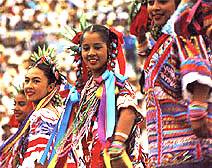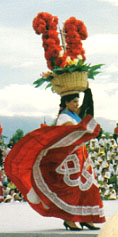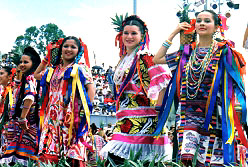|
OAXACA IS GUELAGUETZA!
 |
|
Bailables | |
Guelaguetza festival will be held on Monday, July 22nd and Monday, July
29th, 2019.
The famous Guelaguetza festival is held each July in
the Mexican state of Oaxaca (WA-HA-KA). Also known
locally as "Los Lunes del Cerro" (Mondays on the
Hill), this celebration takes place on two consecutive
mondays. A beautiful cultural event dating back
hundreds of years, this festival attracts visitors
from around the world.
Participants from the seven different regions of the
state gather in the capital city, also named Oaxaca,
to dance, sing and play music. This cultural exchange
is a visually stunning exhibit of color and movement.
The dancers and musicians wear clothing representative
of their district. Their costumes, decorated with
ribbons and bells, add a
wonderful presence to the festivities.
In addition to folkloric dance and song, the cultural
exchange extends to culinary delights. Regional food
specialties are featured, enchanting the taste buds
with exquisite flavors. Oaxaca is internationally
known amongst food connoisseurs as having
exceptionally delicious cuisine. Tantalizing Oaxacan
dishes typically feature exotic mole (MO-LAY) sauces
accompanied by fragrant aromas.
The roots of the Guelaguetza festival call upon
pre-Columbian traditions that have existed for
millennium. Indeed, the word "guelaguetza" hails from
the Zapotec Indian language and means an offering or
gift. Included in the translation is the concept of an
exchange, or an act of reciprocity. Guelaguetza was
woven into the area's indigenous cultures as a form of
social etiquette and expectation. Its practice
benefited everyone involved.
 |
|
Bailadora | |
Since time immemorial, the area's indigenous peoples
honored the goddess of maize (corn) through ceremony
and ritual. Each year at the height of the rainy
season (mid-July), the people would gather and pay
homage to Centeotl, the corn goddess. These
supplications were performed to assure a bountiful
forthcoming harvest.
During the Spanish colonial period, Catholic
missionaries sought to dissuade such pagan rituals. As
a result, the church promoted the feast of the Virgin
of Carmen, celebrated on the 16th of July, as a
countermeasure to the corn goddess festivities. A
hybridization of cultures occurred and the two
distinct traditions became interwoven over time,
finally evolving into the modern La Guelaguetza
festival we know today.
In 1932, the city of Oaxaca held a grand celebration,
to commemorate its 400th year anniversary. It was
designated a royal city by a decree of King Charles V
in the year 1532. This extraordinary event brought
together participants from the seven regions of Oaxaca
to meet in the capital and share their unique gifts
with one another.
An annual event, the Guelaguetza has become extremely
popular with both nationals and foreigners alike. The
dramatic displays of dance, music and song attracts
thousands of visitors each year. Exquisite textiles,
ceramics and other native arts are also highlighted
with each region represented.
The dates of the festival fluctuate each year,
according to the calendar and the following
calculations. Typically, the first date falls on the
monday after July 16th. However, an exception exists
to this formula. Should the monday in question fall on
the anniversary of President Benito Juárez' death
(July 18th), the start date is traditionally delayed
by one week. Due to the dates changing each year, it
is best to check with your travel agent when making
your reservations.
 |
|
Danza Piña | |
Official ceremonies commence at dawn on the festival's
first day. These celebrations take place on a hill
that has a wide panorama of the city. This major
landmark, "Cerro del Fortin" (Fortin Hill) has been
the site of many events throughout Mexico's history.
It is an ideal spot for the festival and boasts a
wonderful open-air amphitheater where the main
performances take place.
In the true spirit of Guelaguetza, the dancers at the
end of their performance toss gifts into the crowd.
These offerings represent their region's specialty and
might include straw hats, flowers and even pineapples!
In addition to the two Monday celebrations, adjacent
festivals and parades occur on the weekend preceding
the main event and throughout the week.
Women wearing traditional dress accompanied by baskets
of flowers provide a lovely element to these
processions. Large walking puppets delight the many
children who are in attendance. Fireworks complete the
festive atmosphere which is charged with electricity.
There is a competition to elect a contemporary Goddess
Centeotl and reenactments of the life of Princess
Donaji, the last Zapotecan princess. The Guelaguetza
Festival truly is a wondrous cultural event enjoyed by
everyone in attendance.
|